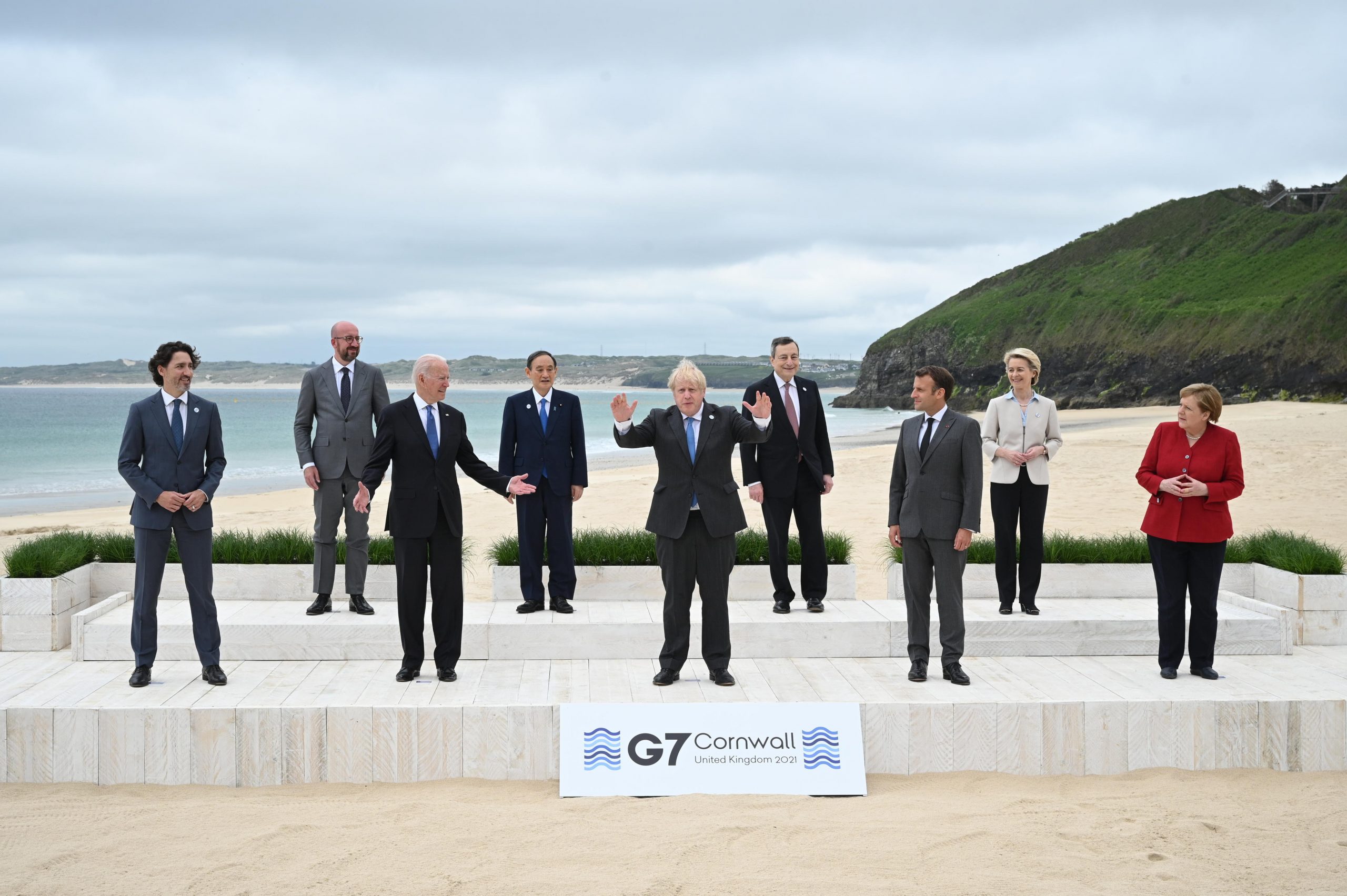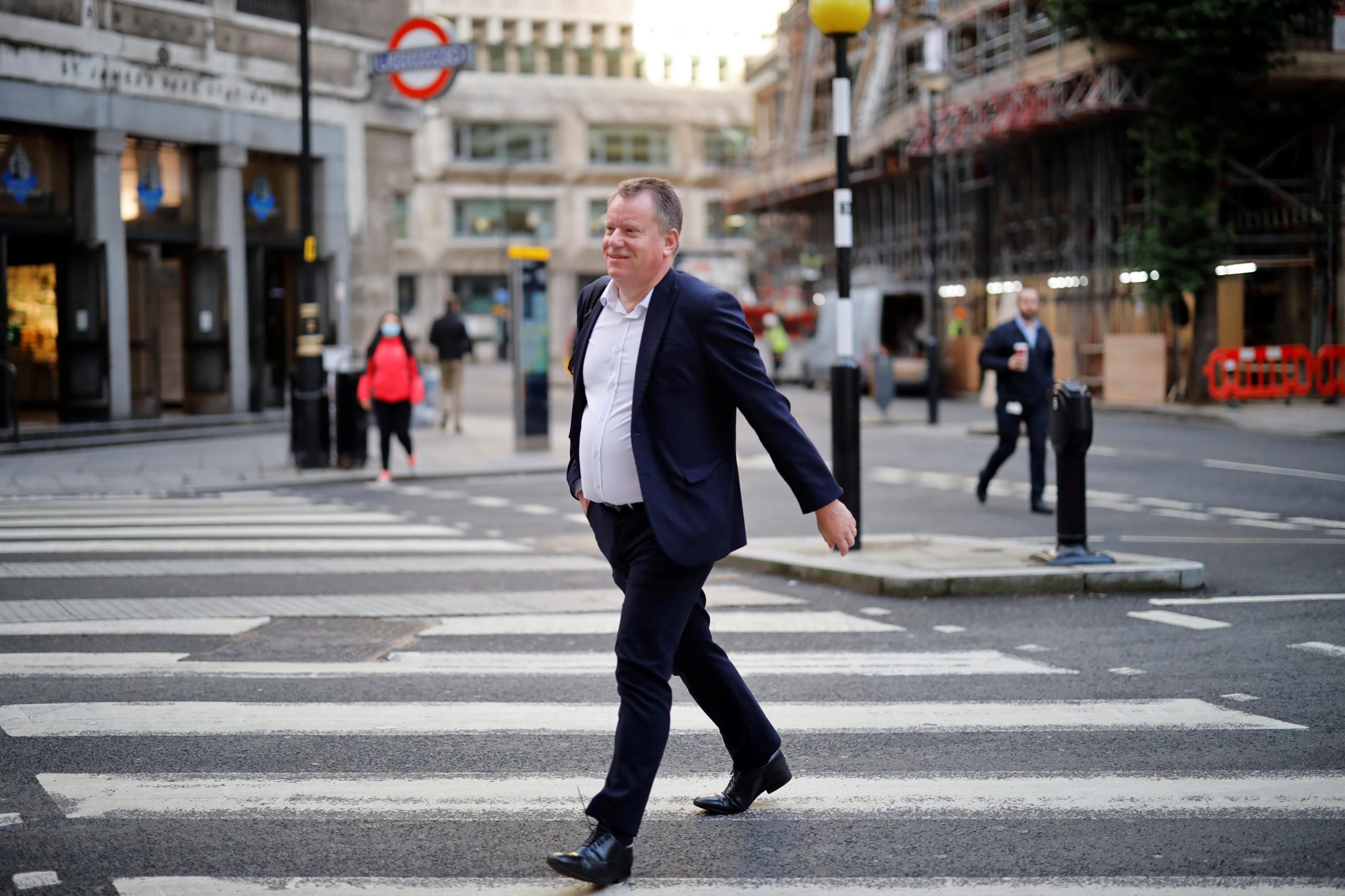
Credit: Leon Neal/Getty Images
In the two years since Boris Johnson became prime minister, he has propelled ‘Global Britain’ to the peak of an international leadership style that may be best described as self-caricature.
With Donald Trump and his bottle-blond combover gone at least for now and Kim Jong-un’s bouffant mostly hidden from view in North Korea, it is Johnson’s floppy golden mop, cartoon Englishness and bumbling boosterism that have come to define comic book machismo… as well as post-Brexit Britain’s image in the world.
The UK, a senior Indian diplomat acidly noted, ahead of Johnson’s planned visit to India in April this year, is “reeling (from) its self-goal of quitting the European Union, is desperately seeking an enhanced independent international profile and has still not accepted its dramatically reduced role in global affairs. Fantasy has no cure”.
In the end, Johnson bowed to the inevitable and cancelled that trip in the face of India’s surging coronavirus crisis and had to make do with a virtual summit with prime minister Narendra Modi in May.
Building up its relationship with India seems to remain a major focus of the UK’s “Global Britain” ambitions and this month India’s most senior diplomat Harsh Vardhan Shringla arrived on these shores to discuss Roadmap 2030, a coordination strategy between New Delhi and London. India seems willing enough to do business with Britain but it is not betting that Johnson will be calling the shots well into the future.
For there have been some markedly queasy moments of late for the UK prime minister. A byelection defeat in a safe Tory seat; a much-pilloried speech on his signature agenda to “level up” Britain’s acute regional disparities; the determined recklessness of “freedom day”, the July 19 reopening of all of England, including nightclubs — throw off those masks, it’s all on you now — while coronavirus cases surged and Johnson himself was forced to self-isolate.
There is a growing perception – not just in the UK, but now widespread around the world – that there is one rule for the favoured few and another for the little people, otherwise known as the British public. The sense that an entitled chumocracy — of the kind Britain once lectured other countries about — is in charge of the UK government. It’s a sort of “state capture”, to use the term that became a buzzword in South Africa and brought Jacob Zuma’s presidency to a premature end in early 2018.
Even Johnson’s virtual press conference the day of England’s great reopening merely seemed to link the British government to a long-distant farce in faraway Baghdad. The spectacle of a British prime minister liberating his people while himself in solitary confinement, revived memories of ‘Comical Ali’, Saddam Hussain’s information minister, memorably telling journalists the “infidels” were facing “slaughter” even as TV cameras showed US tanks rolling in behind him in 2003.
Johnson has been a bonanza for the world of international comedy, his cabinet’s hypocrisy and folly a steady source of ceaselessly shared social media memes and clips, his determination to “get Brexit done” viewed with puzzlement in African countries, which are labouring to build up an EU-style free trade area.
In Europe, he is viewed as “The Queen’s jester” (Libération), “a man who looks like he slept in his car” (Berlingske, from Denmark) and the “clown who wanted to be king of the world” (Frankfurter Allgemeine Zeitung).
A Russian TV channel has also noted that Johnson is “best known, not for his work, but his eccentricity”. From Australia, there is Sammy J’s Brexit Yoga, an online faux exercise class in which the Australian comic urges viewers to “get back control of our bodies” and demonstrates postures such as “Rising Nationalism”, “Downward-facing Economy” and “Scottish Independence”.
One of the earliest signs that Johnson’s Brexit push was destined to become an international gag came in a packed theatre in the Tunisian capital after the referendum. I watched Bassem Youssef, who’s often called the Egyptian Jon Stewart, describe Britain’s impending departure from Europe. “After centuries of dividing the world, now Britain is dividing itself. Karma is a bitch,” he said with a laugh.
Even ISIS, a terrorist group that isn’t known for the jolly types among its ranks, has humorously promised on Telegram that “The mujahideen will keep their cells in UK separate from EU in respect of #Brexit”.
So the joke is on Britain as well as its chief Brexiteer and one can’t help but think even the deadly serious publication in March of ‘Global Britain in a Competitive Age’ – the government’s reboot of its international outlook – has the former colonies (and the comics) metaphorically cocking a snook and blowing raspberries.
The review was the most comprehensive assessment of Britain’s place in the world since the end of the Cold War. It told a good story, as might be expected from a government that’s led by a man who believes “people live by narrative, human beings are creatures of the imagination”. But the conceit of a “Global Britain” has not lived up to its billing.
The prime minister’s efforts to rebrand Britain as a trustworthy vital player on the global stage are suffering. “Global Britain” has reneged on the overseas aid spending commitment of 0.7% of gross national income specified in its policy review, as well as the Conservative Party’s 2019 election manifesto. There is also Johnson’s slippery attitude to the hard Brexit agreement he signed with the EU in 2019. David Frost, his Brexit minister, recently published a paper that proposed dismantling key parts of the deal that governs post-Brexit trade with Northern Ireland.
The Americans are clearly not amused by Johnson reneging on the Northern Ireland Protocol. Brendan Boyle, a congressman from president Joe ‘Irish’ Biden’s Democratic Party and member of the Irish caucus on Capitol Hill, has said, “the British government has tried to evade its responsibilities (and this) serves only to further destabilise Northern Ireland”.
The Irish themselves are pretty unhappy at the UK’s actions. A mildly-worded editorial in the Irish Times nevertheless reflected a common view that Johnson’s relationship to the truth is somewhat flexible. “Trust is in short supply when it comes to the British prime minister, who has shown little evidence that he is acting in good faith,” the paper noted.
And the Germans are mad as hell. Sebastian Fischer, spokesman for the German permanent representation to the EU, demanded, “Is it too much to expect the UK to stand by what it has negotiated, signed and ratified?”
It’s not cricket, certainly not as Britain taught the game in far-flung parts in the age of empire, and foreign governments are taking note of London’s trustworthiness.
Policy wonks in the emerging economies are starting to ask hard questions about why a shrunken UK, possibly diminished by Scotland voting for independence, should continue to have a coveted permanent seat on the UN Security Council.
For most of the 76 years the UN has existed, its powerful veto-wielding P5 – ‘permanent five’ – membership has reflected a vanishing age, a time when the only thing that mattered was who won the Second World War.
P5 members are expected to have the three Cs – clout, contribution to the UN, and capacity to act in defence of international security and participate in a demanding UN agenda. But Britain, as a UN specialist at the European Council on Foreign Relations has rather cruelly noted, may increasingly find itself “the runt of the Security Council”.
Germany, meanwhile, is making growing noises that it should
have a seat on the council. The UK has been conspicuous in supporting Berlin’s bid, perhaps conscious of being dragged into comparisons between its credentials and Germany’s.
This is the state to which Britain is reduced, under Johnson’s stewardship. What about the man himself? Is he diminished as well, despite the big transformational agenda, the assured word clouds – flummery, twaddle, hokum, bunk, ketchup of catch-up – the 80-strong parliamentary majority and an election that’s nearly three years away?
No one knows. Yet. The world is watching in alarm as merry, unmasked England marks its status as the most unrestricted society in Europe despite the coronavirus case load running higher than most of the world. There have been encouraging signs that the UK numbers may be falling, but there is a long way to go and the country is not out of the woods yet, by any means. Some scientists remain concerned that Britain’s ‘open’ approach this summer may help foster another strain, perhaps one that could be even more contagious.
If that happened, the world would blame Johnson and this would truly be the ‘Boris variant’. He would have the international stature he sees. Though not the kind he wants. Of course, if the British gamble over Covid – a massive epidemiological experiment – does pay off, and those case numbers do fall, then the world might applaud the UK. And Johnson will be seen as incredibly lucky rather than wise. After all, much of the world does already seems to have made up its mind about him.
Rashmee Roshan Lall, PhD, writes on international affairs and lived and worked in eight countries in the past decade. She blogs at www.rashmee.com and is on Twitter @rashmeerl


